
Originally appeared at Memoriabg, translated by Valentina exclusively for SouthFront

Ivan Zapryanov
Ivan Zapryanov is a military expert on defense and security. He graduated from the National Military University, ‘Vasil Levski’, Veliko Tarnovo, specialty ‘Military Intelligence’. He served in the Special Forces brigade. Between 2004 and 2005, he participated in the mission for post-war reconstruction of Iraq in the composition of the 4th Infantry Battalion, and in 2010, in the ISAF mission in the composition of the 18thBulgarian contingent in Afghanistan. He graduated from the Command and Staff College of the University of the Marine Corps, Quantico, USA. In 2014, he graduated in ‘Analysis of Defense’ at the Naval Postgraduate School in Monterey, USA. He has completed a ‘Selection and Training of Operators of the Special Forces’ and ‘Civil Activities’ courses at Fort Bragg, North Carolina, USA. He graduated from the Spiritual Seminary ‘St. St. Cyril and Methodius’ in Plovdiv.
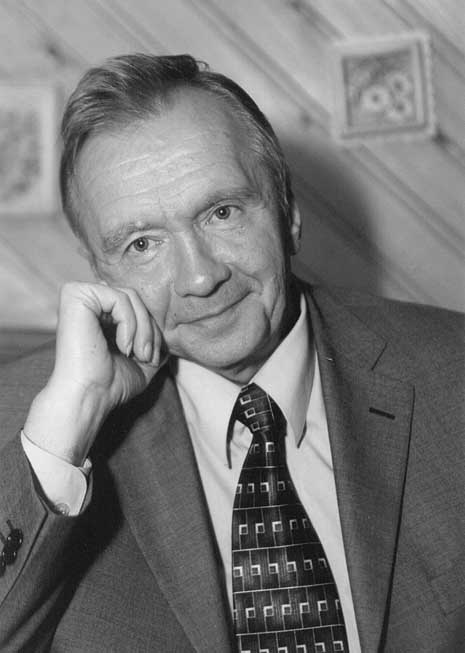
Alexandr Panarin
“Pay attention: today, China is 10 times stronger than Russia; physically, economically and even technologically. Regardless of this, Americans are less afraid of China. India is a powerful country but it does not cause particular concern in the United States. But they are really afraid of Russia. Do you know why? Russia has a mysterious property: it can rally the weak against the strong. Globally, the Russians are called on to humiliate the strong for their insolence.” – Alexandr Panarin
A quarter of a century after the end of the Cold War, it became clear that it has never stopped and the risk of a hot war today is higher than in the years of confrontation between the two superpowers represented by the US and USSR.
As was the case a century ago, Moscow still continues to be regarded by Washington and its allies as the biggest enemy and not because of Russia’s aggressiveness and its intentions to destroy the United States or its allies, but the fact that Russia is the only obstacle to Western civilization’s, particularly the United States, world domination.
For this reason, after the collapse of the USSR, NATO should have ceased to exist but NATO expanded its geography. The US’s goal was and remains to prevent Russia from regaining the lost positions in Eastern and Central Europe because after each collapse, like what Russia experienced in the late ’90s, the phoenix is reborn. And when Russia began to recover, the West began to attack with all available means.
Over the past two years, we have witnessed intensive information and psychological war whose active phase started at the end of 2013. The reason for and the subject of attack then was the Winter Olympics in Sochi. In order to discredit the Kremlin, Western media poured on its audience an enormous amount of misinformation. The effect was short-lived, after the successful completion of the games, the stars of the West in winter sports declared their satisfaction and admiration for the organisation and conduct of the games, describing them as the most successful up to that time. The Winter Olympics in Sochi were held in the period 7-23 February.
As in 2008, when Saakashvili started shelling civilians, so in 2014 Kiev violated the principle of peace during the Olympic Games, where protests grew into riots, ending with the carrying out of a coup. The security and rights of ethnic Russians and Russian-speaking citizens of Ukraine are under a real threat, as is evident by the messages of protesters and political figures that represent them. And if in 2008 the United States aimed to verify the determination and willingness of Kremlin to defend its national interests, then in 2014 the US expected exactly what Russia did: protected its citizens abroad and their national sovereignty and did not allow Crimea to become a base for the US and NATO.
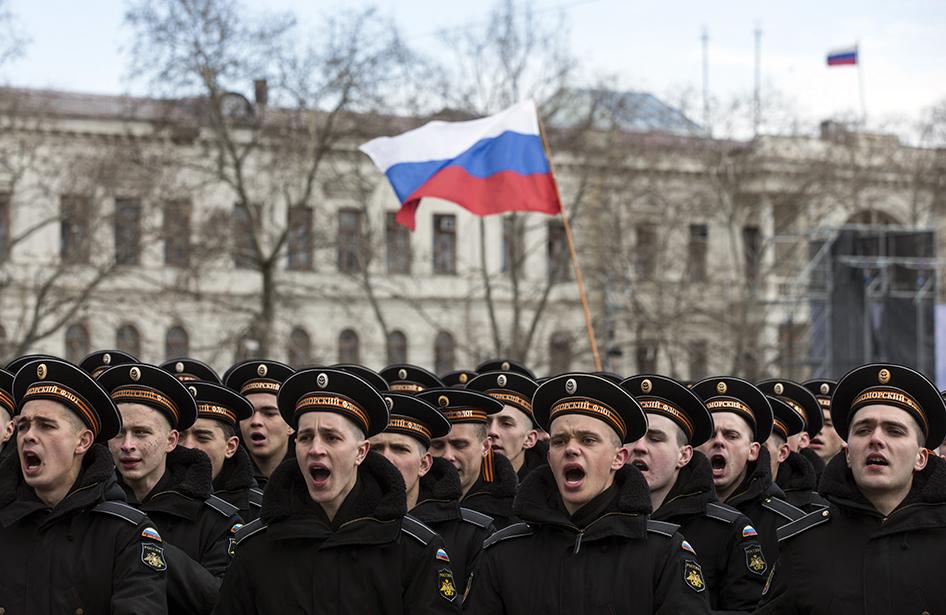
Russian naval forces participate in a festive ceremony marking the first anniversary of the signing of the Treaty for Adoption within the Russian Federation of the Independent Republic of Crimea. Sevastopol, March 18, 2015.
The Ukraine should be the USA’s revenge to Russia for its decisive intervention in Syria, preventing President Assad from sharing the fate of the leader of Libya, Gaddafi. The USA aims to shift the focus of attention, of both Russia and the global community, from Syria to the Ukraine. And while power in Kiev was taken by radical fascist forces, Syria is about to become the next failed state under the pressure from Islamic jihadists which the United States used for achieving its geostrategic goals.
Under the pretext of the “aggressive actions” of Russia in Ukraine, the USA and the West imposed many sanctions on Moscow aimed at its weakening and depriving Moscow of the opportunity to influence the processes in the Middle East, in particular, to provide substantial military aid to its longtime ally, Syria.
A major lever of the US and its allies for changing the public’s opinion is disinformation and manipulation of public opinion. For the past 100 years, the US establishment relied on information and psychological campaigns to convince their otherwise law-abiding citizens of the necessity of war against one or another country in the name of “national security of the United States.”
In an era of unprecedented advanced communications and social media, a fundamental component of a modern hybrid war (except cyber, proxy, low-intensity conflicts, ethnic and religious conflicts, global terrorism, illegal migration, proliferation of weapons of mass destruction), is the so-called StratCom (Strategic Communication), representing a compilation of psychological and information operations propaganda.
Because of the critical importance of strategic communication in the formation and reformation of public opinion, the focus of this analysis will be on StratCom. For this purpose, first, I will present to the honorable reader a part of the clearest statements of high-ranking political and military figures from member states of the European Union (EU) and the North Atlantic Treaty Organization (NATO) in address to the Russian Federation made in the last months; second, I will identify what is common in the examined statements; third, in the role of “devil’s advocate” through the prism of today’s military-political leadership of Russia, I will examine the validity and reliability of the theses made in the applications, i.e., are these allegations based on serious arguments and facts or do they represent propaganda rhetoric, based on misinformation and manipulation whose target audience is not so much the Russians as the citizens of the EU and NATO’s countries.
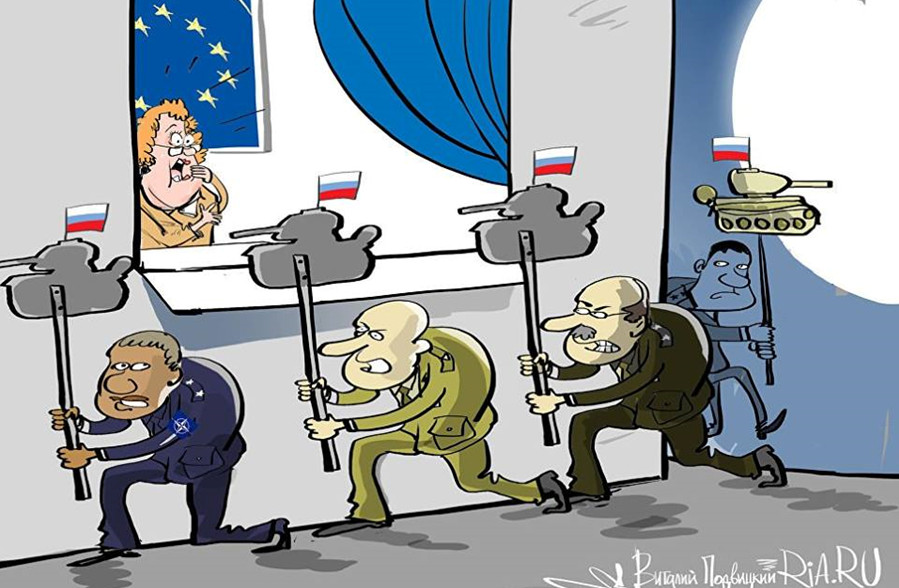
February 25, 2016: The Supreme Commander of the Allied Forces in Europe at that time, General Philip Breedlove, stated in the US Senate: “Russia seeks to exercise definite influence on neighboring countries in its buffer zone …, so it uses military force, violating the sovereignty and territorial integrity of the Ukraine, Georgia and others … I see Russia as a real threat and I simply point out that this is a nation that has thousands of nuclear weapons and they talk about the use of these nuclear weapons all the time.”
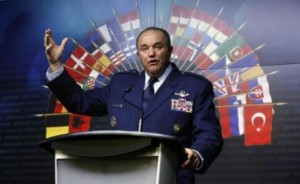
Philip Breedlove
According to Breedlove, Russia’s armed forces increase their power and professionalism, and given the current foreign policy of Russia, it cannot but worry the United States, and that “Russia seeks to restore its leading role on the world stage, and this limits our (of USA – author’s note) opportunities.” And yet: “Russia chose to be an opponent and a long-term existential threat to the United States and our European allies and partners.” And finally, “to oppose Russia, the European Command (US – author’s note) is currently working together with allies and partners to restrain Russia and is prepared to fight and win, if necessary.”
March 1, 2016: The Chairman of the Committee of the Armed Services of the US Senate, Senator John McCain, said during the hearing of General
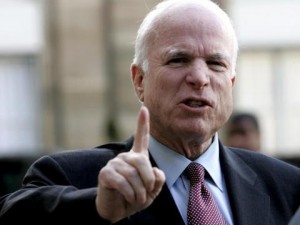
John McCain
Breedlove: “It’s not that the US and NATO did nothing to respond to challenges coming from Russia. It is a fact that none of the actions we have taken so far are adequate to the scope, scale and seriousness of the challenges that Russia poses to our national security and international order … In short, the US and NATO should be ready to deter and, if necessary, to beat Russian aggression, whether nuclear, conventional or the hybrid domain.”
March 27, 2016: Breedlove suggested to return the relic U-2 (reconnaissance aircraft) back to the field of operation as an “additional platform for intelligence gathering” as opposed to the threat from Moscow.
A brief retrospection: the US used U-2 during the Cold War very successfully but the status quo changed on May 1, 1960, when the Soviet air defense forces managed to strike it. A year later, on October 27, 1962, at the height of the Cuban Crisis, the Soviet air defense forces destroyed U-2 in the skies over Cuba. It nearly led to a nuclear war. In case of renewal of flights of the relic U-2, if in violation of the Russian airspace, the plane will be shot down. Considering the tension between the US and Russia, it could have irreversible consequences.
April 30, 2016: Breedlove said: “Russian aggression is clearly visible in its illegal occupation of Crimea and its subsequent operations in eastern Ukraine … Russia’s aggression destabilizes also the neighboring countries and the region, and its illegal actions create instability near the borders of NATO “.
On May 4, 2016 General Breedlove retired from active military service and joined the headquarters of the candidate for president of the United States, Hillary Clinton. In case Clinton wins, Breedlove is expected to get a high position in her administration.
June 23, 2016: Faithful to his style, the already retired general Breedlove said again that Russia is an existential and a constant threat to the US and the world order: “At the heart of any strategy in Europe should be the understanding that Russia is a timeless existential threat to the United States, its allies and the international order. Russia intends again to be a world power … Moreover, the Russian intervention in Syria demonstrates an intention of Moscow to extend its influence abroad.”
“Putin is not a partner in security,” Senator McCain says, who is actively involved in planning and organizing color revolutions in former Soviet republics, the Arab Spring, keeping the so-called “moderate opposition” in Syria and an active participant in the organization of the Maidan and the subsequent coup in Kiev; he is also a US envoy in Bulgaria to convince the government to suspend work on the ‘South Stream’. After that, the resignation of the government of Oresharski followed.
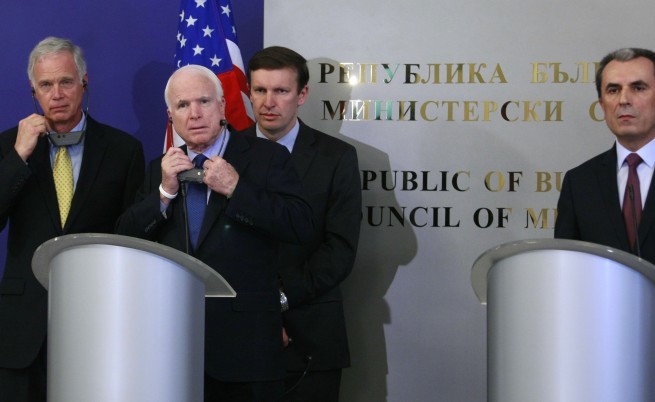
Prime Minister Plamen Oresharski announced the suspension of the ‘South Stream’ at a briefing in the Council of Ministers after the meeting with US Senators John McCain, Christopher Murphy and Ron Johnson. Sofia, June 8, 2014
“On September 11, Putin did not hesitate to call his new friend, George W. Bush to declare his full support for the United States and the American people,” the political science professor and former US Ambassador to Russia, Michael McFaul recalls.
“We were the first country to support the American people then; first to react as friends and partners after the terrible tragedy of September 11th,” President Putin said later.
Russia’s support for the US in the war on terror was launched on September 24, 2001 in terms of five points: (1) Russian agencies will share intelligence information with their US counterparts; (2) permitted airspace for flights providing humanitarian aid; (3) cooperation with the Central Asian allies of Russia to provide access to their airspace for US flights; (4) participation in international efforts in search and rescue operations; (5) an increase in direct aid – humanitarian and military – to the Northern Union and the government of Rabbani in Afghanistan.
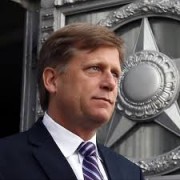
Michael McFaul
“The pro-American plan of Putin is not just tactical. Putin’s policies in expressing support after September 11, including the consent for US military presence in Central Asia, represent a significant change in Russian foreign policy. The potential for progress: A fundamentally new and improved relation between Russia and the West has never been greater. If we fail this time, however, the next window of opportunity may not be open for decades to come,“ Michael McFaul believed at the time.
In addition, Putin sent a clear message to the US that he does not believe Washington is an opponent when “he voluntarily removed Russian bases from Cuba and the Kamran Gulf in Vietnam,” as Jack Matlock, the last US ambassador to the USSR claimed.
In gratitude, the second extension of NATO followed in 2004. Thus NATO already borders with Russia, without a hint of provocation, threat or challenge from Russia towards the West, on the contrary – only retreat and compromise. And when Russia decided to defend its interests and took a defensive position, the accusations began.
The USA calls “partnership” what Russia considers humiliation, experienced and endured after the collapse of the USSR. According to President Putin, US “partner” means “vassal,” a country without sovereignty, with a shattered economy and armed forces. For Putin it is clear that the West has no intention to ally with Russia, neither considers it equal in status. “I think our partners do not want allies, they want vassals. They want to command, but Russia does not work that way,” Putin is categorical.

Stephen Cohen
Instead of building an alliance or a stronger partnership after 9/11, in the words of American explorer of Russia and Russian-American relations, professor Stephen Cohen, “a triumphalist reaction from Washington regarding the end of the Soviet Union led to the diplomatic approach: ‘winner-take-all’ which was so aggressive.”
At the same time, while accusing Russia of interference in the internal affairs of neighboring countries, the United States for two centuries already follows the ‘Monroe Doctrine’ whose goal is not just limit but prevent interference of the European powers of the Americas, laying the foundation of total domination of the US in the region. Moreover, the “Monroe” doctrine is seen as a model for the behavior of the political class in the US which believes that Washington is called upon to dominate over other countries in the Americas. Subsequently, the myth of “exclusivity” arose, i.e., the superiority of one country and one nation over others (analogy with the Third Reich).
In practice, the US rejected the part in the ‘Monroe Doctrine’ on non-interference in the internal affairs of countries in Europe, but at the same time, they follow it in the part for non-interference of European countries in the Western Hemisphere and in performing interventions in South America. In the ‘40s of the 19th century, guided by the principles of the ‘Monroe Doctrine’, the USA joined to its territory more than half the territory of Mexico: the states of Texas, California, Arizona, Nevada, Utah, New Mexico, Colorado and Wyoming of today. Nowadays, Brazil is the latest example of intervention by Washington, and the attempts in Venezuela continue so we will probably be able to witness a civil war there soon. In March 2016, President Obama renewed for one year the so-called Executive Order (the Executive Order), in which Venezuela is defined as “an unusual and extraordinary threat to the national security and foreign policy of the United States.” Obama declared the so-called ‘Act on National Emergency’ (the Emergency National Act) to counter “the threat of Venezuela.”
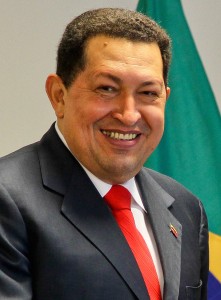
Hugo Chavez
In 2008, then President of Venezuela, Hugo Chavez, said in an interview with American journalist, Christopher Hitchens, historian Douglas Brinkley and actor Sean Penn: “The Monroe Doctrine has to be broken. We’re stuck in it for almost 200 years. Jefferson (third president of the United States in the years 1801-1809) said that America should swallow one after the other the republics in the south. The country where you were born, is based on imperialist approach.”
In the words of former deputy minister of finance of the United States during the presidency of Ronald Reagan, Paul Craig Roberts, “this fabricated ‘extraordinary threat’ serves as justification for the regime of Obama to overthrow President Maduro in Venezuela. It’s a tradition to Washington – to remove lawfully-elected Latin American governments that try to represent the interests of the people and not the interests of US corporations and banks … Washington conducts an economic war against Venezuela to undermine public support for president Maduro. The media controlled by the elite blamed Maduro for the economic problems caused by Washington.”
In one of his last articles, the American expert on geopolitics Conn Hallinan wrote: “Most NATO members have no interest in a war against Russia, but others
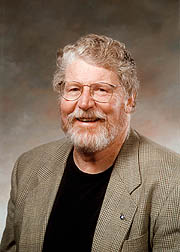
Conn Hallinan
make it sound as if it would not be a bad idea,” referring to the statement of the Minister of Foreign Works of the far-right government of Poland, Witold Vashchikovski that Russia is “more dangerous than Islamic State.”
April 15, 2016: The Minister of Foreign Affairs of Poland, Witold Vashchikovski said: “Russia’s activity is a kind of existential threat, as this activity can destroy countries … We also have non-existential threats such as terrorism, large waves of migration … Islamic State … is not an existential threat to Europe.”
Vashchikovski equated the waves of migration and terrorism, given that since 1989 millions of Poles were evacuated from Poland to Western Europe and the USA. IS is not an existential threat to Poland but Poland is not Europe, but part of Europe. The autoktonnite French citizens would hardly agree with the Polish Minister that “Islamic State … is not an existential threat to Europe.” Of course, the millions of refugees are not heading to Poland; Poland does not share borders with Turkey, which recently has been a subject of terrorist attacks by IS.
Amid continuing threats of terrorism and the many terrorist attacks that killed hundreds of peaceful European citizens, amid the massive flow of refugees, amid a rapidly changing ethnic, cultural and religious composition of the European Union, the statement of Vashchikovski is a demonstrative example of a info- and psychological operation: on the one hand, the minister manipulates and misinforms (information operations), and on the other side he incites hysteria and paranoia as a secondary effect (psychological operation). The target audience is hundreds of millions of citizens of the EU and NATO.
Since the collapse of the USSR, I am not certain of a country, from the EU or NATO, which was invaded by Russia. Russia does not take innocent lives and the demonized Putin did not send millions of migrants to the EU, making them impose their values, cultures, traditions, rules and norms of behavior over 510 million citizens of the Union. No Russian Orthodox churches were built en masse in the EU but hundreds of mosques. In the period 1991-2000, Russia survived. It is not serious to claim that Russia pursues imperial interests and aims to increase its territory to the west, given the size of Russia and very few people for these dimensions (and to control an occupied territory human resources are necessary in the first place, besides support in the face of the majority of the local population – and this is the center of gravity). The United States through NATO landed troops and heavy weapons on the border with Russia, including absolutely every former member of the Warsaw Pact and former republics of the composition of the USSR in the North Atlantic Treaty, and Russia was named as their opponent rather than global terrorism. In response, Russia is forced to defend itself and that is appraised as the “Russian aggression.”
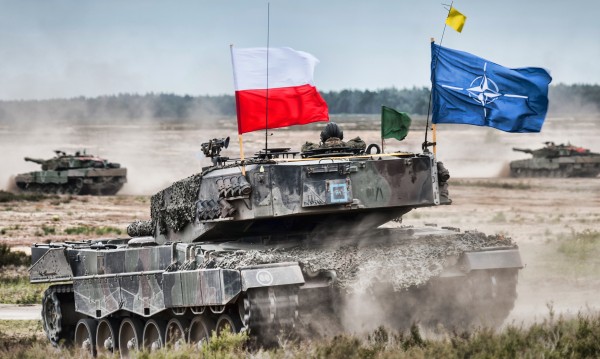
NATO military exercises in Poland
For Europe, and especially Bulgaria, namely Islamic extremism poses an existential threat. The facts speak for themselves:
– Our country is bordered by Turkey – a fact that is self-explanatory;
– 600 000 citizens of our country identify themselves as Bulgarian Turks (no matter what they are actually, but how do they define themselves), the vast majority of whom profess Islam;
– Other 500 000 Bulgarian Turks living in Turkey. This means that at least 1.1 million Bulgarian citizens are of Turkish origin (according to the Constitution, Chapter II, Article 25 pt. 1 “a Bulgarian citizen is everyone who has at least one parent who is a Bulgarian citizen”);
– According to the European Commission, the Gypsies in Bulgaria are between 700 000-800 000. Due to the low level of education among the majority of them, Gypsies are the most vulnerable and susceptible to external influence on the population of Bulgaria.
The statement of the Polish foreign minister is a “tested and proven tactics of the military industry of the United States to maintain its production lines and increase production capacity. Islamic State is terrible, but does not require costly weapons systems to fight against it. The jets U-35, costing $1.5 trillion (total for the entire program – author’s note) are for the Russians, not for the terrorists,” Kahn Halinan says.
In terms of the existential threat posed by Russia, the Polish Minister simply repeated what was stated earlier by General Philip Breedlove who in turn repeated the thesis of George Friedman, arguing that Islamic extremism “is a problem for the United States, but not an existential threat.”
Especially for Minister Vashchikovski who opposes Russia to Europe, I am obliged to make a brief geographic reference: the territory of Poland is 312 000 km2. The population of Poland is approximately 38.5 million. The territory of all 28 member states of the European Union is 4 324 782 km2, and the whole of Europe is 10 180 000 km2. Only the European part of Russia is 3 960 000 km2, or almost 40 percent of the continent (12.5 times larger than Poland). In the European part of Russia live about 112.5 million people out of a total of 146.5 million inhabitants (three times more than that of Poland) … And if Poland is just a part of Europe, then Russia is the largest European country, both in area and in population. Ergo, there is no sign for equality between Europe and the European Union, because the EU is part of Europe.
And when it comes to aggression and ambitions of expansionism and imperialism, it is good to pay attention to these facts put forward by Khan Halinan: “Russia has two bases in the Middle East and several in Central Asia (in former Soviet republics – author’s note). The United States has 662 bases worldwide and Special Forces (SOF), located between 70 and 90 countries at any given time. Last year (2015) SOF were active in 147 countries. US actively participates in five wars … The Russian military spending will fall next year, while the US will exceed the military spending of Moscow tenfold. Who looks menacing in this comparison?”
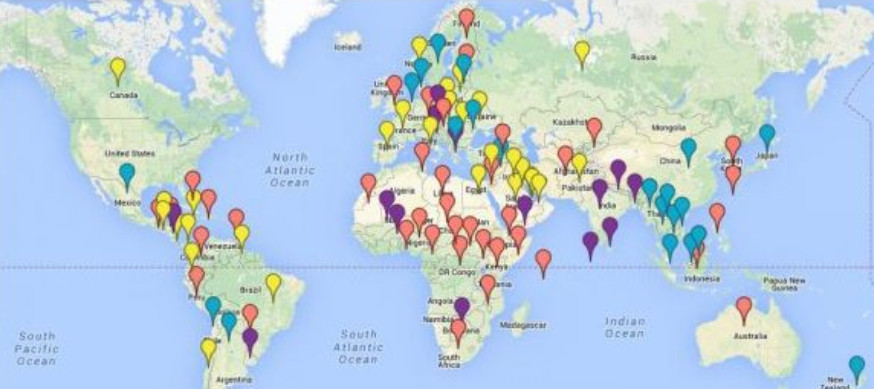
The Presence of US Special Operations Forces (SOCOM) outside the United States
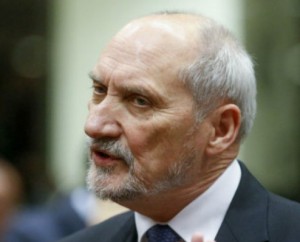
Antoni Mitsarevich
June 16, 2016: Defense Minister of Poland, Antoni Mitsarevich said that Russia “is the biggest threat to global security today,” adding further that “no country in recent history … has undermined international order to the extent that Russia has made, first by attacking Georgia, then Ukraine, as occupying territory of an independent state, openly demonstrating that Russia does not accept the independence and sovereignty of this country.”
July 6, 2016: “Russia should be seen as the biggest threat to peace in Europe … Russian troops in Syria are causing more and more concern among our allies,” Mitsarevich says.
A brief flashback: in 2003 Poland participated in the invasion of sovereign Iraq. Today, analysts in the east and west are unanimous that the crisis in the Middle East is a direct consequence of this war. At that time, Russia, China, France and Germany were first to show “concern” but the US, Britain, Australia and Poland did not comply with them. Both de facto and de jure, Poland has direct, immediate responsibility for the disastrous consequences of the Iraq war, including the refugee wave towards Europe today.
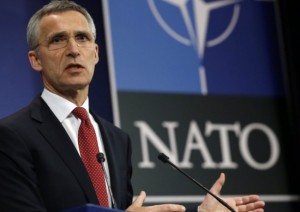
Jens Stoltenberg
June 16, 2016: NATO Secretary General Jens Stoltenberg said that Russia carried out “large-scale arming on the border with NATO … Russia is trying to expand its sphere of influence by military means … The deployment of troops in the east – this is an adequate response to the aggressive actions of Russia … we want to show our partners that we are here when they need us. And we want to show to the potential aggressors that we would react if they threaten us.”
The facts, however, differ with Stoltenberg’s allegations. In 2006 the US signed with Bulgaria and Romania an agreement to deploy 5 000 troops in each of the countries. Describing the rapid adoption of former Soviet satellites into NATO as a “mistake,” former Secretary of Defense Robert Gates said that the agreement on the deployment of 5 000 US troops in Bulgaria and Romania further deteriorates US-Russian relations. The withdrawal of the US from the Treaty on the Limitation of Missile Systems Defense (the Anti-Ballistic Missile Treaty – ABMT, signed on May 26, 1972 between the USSR and the USA), the applications for future membership of Georgia and Ukraine into NATO, as well as the support for Kosovo’s independence “all led the bilateral relations to the lowest point,” when Putin delivered his speech at the Munich Security Conference in February 2007.
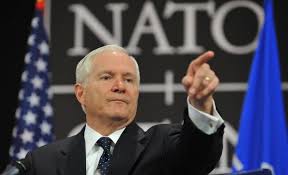
Robert Gates
Robert Gates also recognizes that “from 1993 onwards, the West, especially the US, have been seriously underestimating the extent of the humiliation of the Russians from their loss in the Cold War and the subsequent disintegration of the Soviet Union, which meant the end of the centuries-old Russian empire. After the collapse, the arrogance of the US officials, academics, businessmen and politicians in telling Russians how to conduct their internal and international policy (not to mention the internal psychological shock due to sudden loss of status as a superpower) led to deep and long resentment and bitterness.”
The words of Gates, whose patriotism and loyalty to the United States cannot be challenged, are eloquent enough about who and what causes and determines the foreign policy of Russia today: NATO does not respond to Russia’s actions; Russia responds to the actions of the US and NATO.
Stoltenberg missed the fact that the decision to “deploy troops to the east” is taken not from NATO but from the US, long before 2016, and not in response to the “aggressive actions of Russia” but in order to prevent a possible resurgence of Russia, that would have challenged American dominance. Such a decision occurs in the ranks of the American military and political elite immediately after the collapse of the USSR, as evidenced by the position of Zbigniew Brzezinski outlined in his book ‘The Grand Chessboard: American Primacy and its Geostrategic Imperatives’.
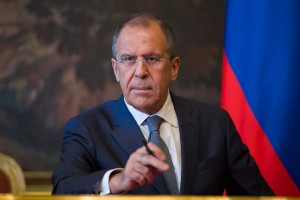
Sergey Lavrov
As in the past, today there is an unwritten rule that states that any crime or offense of the West is blamed on Russia. “Are there historical events or natural phenomena for which Russia is not guilty,” the spokeswoman of the Ministry of Foreign Affairs, Maria Zakharova asks the rhetorical question and the Minister of Foreign Affairs of Russia, Sergey Lavrov, said that “from the beginning of the 20th century … and even the time of Ivan the Terrible, no one wants a strong, self-confident Russia. Over the past century, for the duration of the whole century, the British with the Americans are doing everything to prevent a completeness of Eurasia […] All of this fits into the concept that Zbigniew Brzezinski put in his book, ‘The Grand Chessboard’.
“For the United States … the three major imperatives of imperial geostrategy are to prevent collusion, maintain dependence in terms of security among the vassals … and not to allow pooling of barbarians,” strategist Brzezinski says.
In the period when Brzezinski talked about the expansion of NATO to an eastward direction, including the negotiations with Ukraine on its accession to the EU and NATO, Russia is torn by internal conflicts and has ceased to be a factor on the international scene.
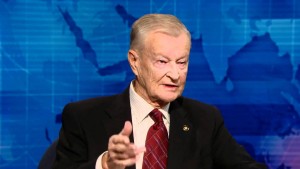
Zbigniew Brzezinski
“Failure to expand NATO,“ Brzezinski noted back in 1997 “can boost the dormant-at-the time or dying Russian geopolitical aspirations towards Central Europe.” Moreover, “the failure of US efforts to expand NATO would have awakened even more ambitious intentions of Russia. It is still not clear – and history says the opposite – that the Russian political elite share the willingness of Europe for a strong and continuous American political and military presence. Therefore … it is important for America to send a clear message about its global priorities. If a choice needs to be taken about a larger Euro-Atlantic system and a better relationship with Russia, for America the former ranks incomparably higher.” That’s what is happening – while Russia is in a political, economic, social and military resuscitation, the US use the window of opportunity for the expansion of NATO eastward, reaching its borders. Brzezinski is confident that Russia should not be allowed to have the right of vote in NATO because this would create conditions for Russia to regain its sphere of influence in Central Europe and reduce the American role in European affairs.
In short, the United States expanded NATO to suppress potential future plans and attempts by Russia to regain spheres of influence, moreover, close to its borders. Therefore, when Stoltenberg blames Russia for its attempts to expand their spheres of influence, let’s answer the question whether Britain, France and Germany have no spheres of influence, whether the US through NATO does not constantly expand their sphere of influence and does not use the Alliance to achieve geostrategic goals. Today, Bulgaria and the former socialist countries and countries of the former Soviet Union are in the sphere of influence of the United States, which is separated by thousands of miles from the territories over which they exercise their influence. At the same time, according to the West, Russia has no right to interest even where millions of Russians live, even in territories which have for centuries been part of its territory. The West would hardly have allowed itself to experience the attitude that it manifests towards Russia.
The fact that the US deprives Russia of a buffer zone causes fears in Moscow. Having survived 1812 and 1941, for Russia a buffer space is of existential importance. We remember the reaction of Washington in 1962 when Moscow positioned nuclear missiles on the territory of Cuba, in response to the US already deploying missiles with nuclear warheads in Turkey. At the time, the US again accused Moscow of destabilizing the world order, although the actions of the Kremlin were reactive rather than proactive, unlike the White House. Today, Russia is capable of deploying nuclear missiles or AMS (anti-missile systems) on the territory of Venezuela, Cuba and Nicaragua. Of course, the US is unlikely to be complacent. One thing is certain, the American people will know how about 150 million Russian citizens feel. If the US has the right to criticize and condemn Russia’s actions in territories which have for centuries been a part of the Russian Empire, then Russia has much more rights to accuse the US, which today have deployed their aircraft and tanks on the border with Russia.
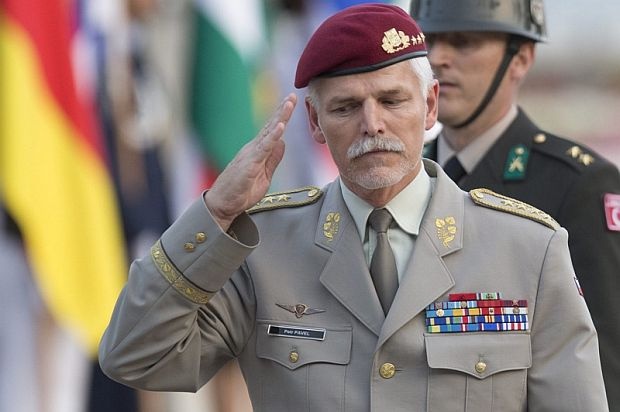
Peter Paul
May 24, 2016: Chairman of the Military Committee of NATO, the Czech General Peter Paul says that the increase in forces on the eastern flank of the Alliance is related to the actions of the Russian army. “If increased offensive capabilities were not demonstrated (by Russia – editor’s note) in Georgia, Ukraine, Crimea and Syria, there would be no reaction from NATO,” adding that eastern member states of NATO “feel threatened by Russia’s assertiveness and aggression.”
As if Russia attacked the unsuspecting and peaceful regime in Georgia, as if Putin organized the coup in Kiev, openly discriminating against the multimillion Russian ethnic minority; as if the Kremlin, behind a facade of false democracy, destroys the Middle East, allying with Islamic radicals against the secular regimes; as if Moscow seems to cause the refugee crisis, as if Russia supports to this day the virtual “moderate opposition” (another name for jihadists in Syria) with the ultimate goal of destroying another secular regime and Islamisation of one of the most advanced Arab republics until recently. At the same time, Russia had not engaged in any military aggression against a member state of the Alliance.
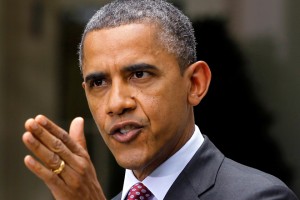
Barack Obama
July 9, 2016: During the conference immediately after the meeting of the NATO Summit in Warsaw, the President of the United States, Barack Obama said: “For almost 70 years of existence, NATO might have never been confronted with such a wide range of challenges all at once: in security, humanitarian and political aspects. NATO members – the United States, Canada, France, Belgium and Turkey have suffered terrible terrorist attacks, organized or inspired by IS. Russia violated the sovereignty and territorial integrity of an independent European nation – Ukraine – and took provocative behavior toward NATO allies. European borders and economies are undergoing testing by millions of immigrants fleeing conflicts and poverty. The vote in the UK to leave the EU raised questions about the future of European integration … In this challenging time, I want to take this opportunity to state clearly what we will never change and this is the steadfast commitment of the United States on security and defense of Europe, the transatlantic relations and our commitment to our collective defense.”
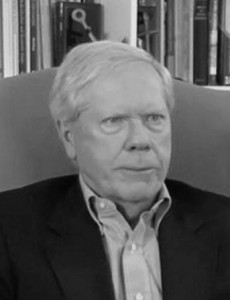
Dr. Paul Roberts
“Father” of Reaganomics, Dr. Paul Roberts, is of another opinion: “Since the regime of Clinton, NATO is an alliance of keeping the offensive war, a war crime under the rules of Nuremberg established by the United States. Under the banner of NATO, a number of countries were attacked, bombed, and had their governments removed from Washington, acting under the cover of NATO. These destroyed countries did not represent any threat to NATO countries and had not taken aggressive action against members of NATO.”
President Obama is yet another politician saying that Russia is not part of Europe. Obama’s knowledge of geography is not fundamental here, but the fact that after the collapse of the USSR, namely the United States, through what he called his “commitment to the security and defense of Europe,” opened Pandora’s box. That’s why the crisis on the continent today is caused by two main and inter-related factors:
The first factor: the expansion of NATO at a time when Russia is not a threat.
The second factor: the invasion of Iraq in 2003 and the Arab Spring of 2010 led to a power vacuum in a number of key countries in the Middle East (first-order effect), created favorable conditions for the emergence and spread of IS and other terrorist groups (second-order effect), causing migratory stream (third-order effect).
To stress on the engagement of the US in terms of security and defense in Europe at a time when, despite the catastrophic consequences for the world (particularly the Middle East, Central Asia, Turkey and Europe), after the liquidation of Hussein and Gaddafi, Washington doing everything to remove Assad, is a manifestation of political arrogance and lack of any morals.
Given that hundreds of institutes, thousands of experts and analysts work in the US, to assume that the crisis in the Middle East is just a string of coincidences, unconscious errors or omissions in US foreign policy over the past two decades is a manifestation of the absolute inadequacy and lack of basic competence. However, if we assume that it comes to unintentional errors; it does not speak well for the American elite, spending money of American citizens and causing the deaths of thousands of American servicemen.

The war in Iraq
According to Russia, through NATO’s expansion and the construction of a sanitary cordon in the inter-marium “from the Baltic to the Black Sea“ and by destabilization of the Middle East, the United States continues to pursue its policy of containment: a military strategy developed by George Kennan at the outset of the Cold War, based on Cordon Sanitaire of the early 20th century, aimed at non-ideological expansion of the USSR. Moscow is convinced that the ultimate objective of the United States lies in the destabilization and subsequent disintegration of Russia, which Washington is trying to achieve in two directions:
FIRST: through crisis (economic and politico-military) relations between Russia and EU/NATO caused initially by:
– The adventure of Saakashvili, leading to murdered Russian military servicemen and hundreds of casualties among the South Ossetian population (effect of the first order), subsequent Russian intervention and successful conduct (second-order effects), Moscow’s recognition of South Ossetia and Abkhazia as sovereign states, respectively, territorial losses to Georgia (effect of third row);
– The colored revolutions in Ukraine, culminating in a violent change of power (first-order effect), leading to the referendum in the Crimea and the civil war in south-east Ukraine (second-order effect), subsequent accession of Crimea to Russia and declaring the DPR and LND, connate territorial losses for the Ukraine (third-order effect);
SECOND, by destabilizing the Middle East with subsequent removal of secular regimes and filling the power vacuum with radical elements consequently directed at Central Asia, the Caucasus, Russia and China for incitement of inter-ethnic and inter-religious war with the final effect: separatism.
The official representative of the Ministry of Foreign Affairs of Russia, Maria Zakharova said about the summit: “A primary analysis of the results of the meeting shows that NATO continues to exist in some military-political mirror … the Alliance focuses on containment of a non-existent threat from the East.“
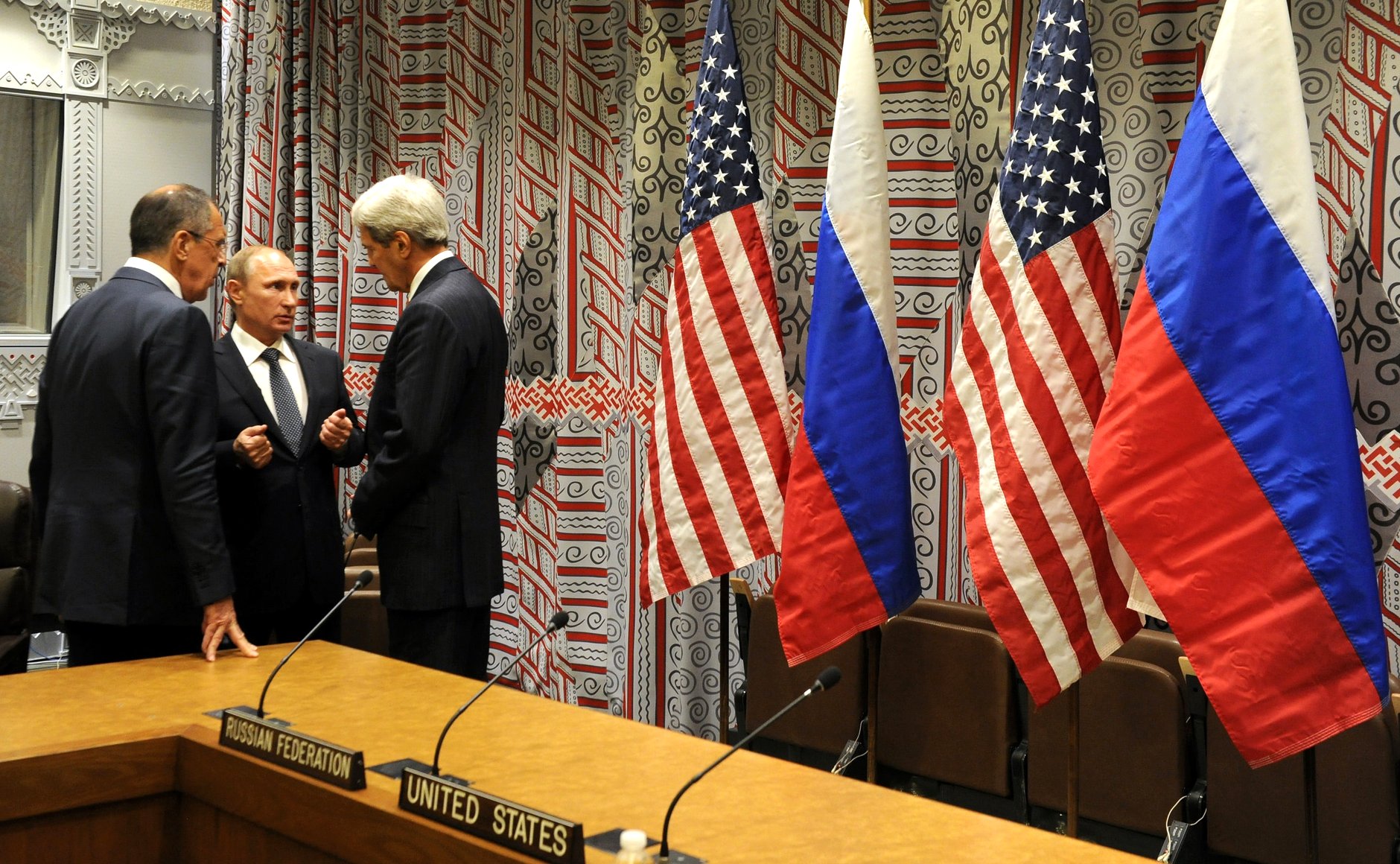
New York, September 29, 2015
According to Zakharova, the imbalance in strengthening the flanks of NATO against the background of an “unprecedented scale of a terrorist threat coming from the south direction,” testifies of the detachment of the bloc’s policy on immediate needs by ensuring the safety of citizens of member states of NATO.
With regard to Russia, Obama emphasized that “there can be no business as usual with Russia until its obligations under the Minsk Agreements are met.”
The Minsk arrangements are the main pillar on which NATO and the EU tread accusations towards Russia. Upon learning the contents of the 13 points of the so-called Comprehensive Measures to Implement the Minsk Agreement, it becomes clear that Russia is not a party to their execution but only witnessed the signing of the agreement as the best man and maid of honor were called as witnesses for the newlyweds, but not legally responsible for the consequences and the future relations between the spouses. In other words, as much as the US/NATO/EU have the right to blame Russia for the failure of the arrangements, so Russia has the right to accuse the US/NATO/EU (in particular, Germany and France, as stated recently by former president of Ukraine, Leonid Kuchma).
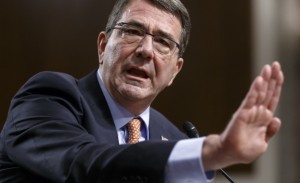
Ashton Carter
7 September 2016: In a speech at Oxford University, England, Secretary of Defense, Ashton Carter, put an equal sign between ‘Islamic State’ and ‘Russian aggression’ as a threat to world peace, speaking of the “containment of Russia” as if Russia located tanks and combat aircraft on Canada’s border with the US.
“For our efforts on containment of Russian aggression … to invest two percent of GDP in defense,” Carter asked and continued: “Despite the progress we have made together in the post-Cold War, Russia’s actions in recent years, its violations of the territorial integrity of Ukraine and Georgia, its unprofessional behavior in the air, in space, in cyberspace, as well as strumming of nuclear weapons, it all demonstrates that Russia has a clear ambition to erode the established international order.”
On July 1, 2016, Vladimir Putin visited Finland where the country’s President, Saul Niynistyo, offered his Russian counterpart a ban on flights of combat aircraft with transponders turned off over the Baltic Sea in order to prevent accidents. Vladimir Putin accepted the proposal and on July 2, Defense Minister of the Russian Federation, Sergei Shoigu, ordered the Russian ASP (air space powers) to carry out flights over the Baltics with transponders on. The Russian side made the same offer to NATO, particularly to the United States. After more than two months of thoughts and passions around an apparently positive initiative, on September 20, 2016 NATO rejected Russia’s proposal on the grounds that these measures are not sufficient to improve flight safety. At the same time, one of the most frequent accusations made to Russian air space powers from NATO is flying with transponders turned off.
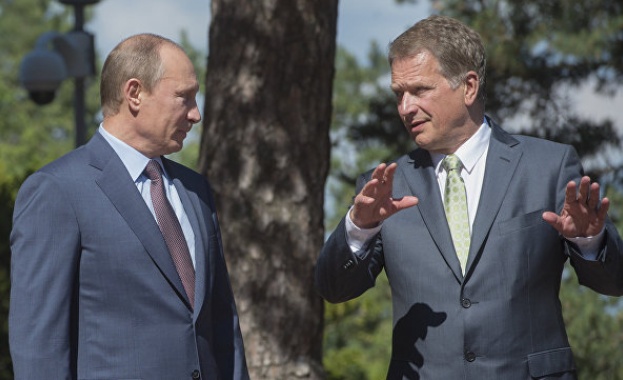
Saul Niynistyo and Vladimir Putin
In fact, the United States and Norway are those who permanently perform their reconnaissance flights close to Russia, which provoke the reaction of the Russian ASP. Apart from that, Moscow has the right to consider US destroyers in the Black or Baltic Seas, armed with hundreds of cruise missiles and reconnaissance aircraft close to its territory as a real threat. And as Dr. Ted Carpenter, a Senior Fellow for Defense and Foreign Policy at the Catton Institute writes: “How would the US react if the naval forces of other power sail uninvited close to US territorial waters, doing it repeatedly despite Washington’s objections? It is unlikely that the US authorities or the American people will take it as a friendly act.” Therefore, the actions of the Russian ASP are absolutely adequate and should not surprise either the United States or its allies.
“US officials and the American news media have to become much more aware and more sophisticated about how other governments and people perceive the hostilities of the United States. Smug assumptions that “we are good, so nothing we do is wrong and provocative,” is both shortsighted and dangerous. From the perspective of other countries ‘reasonable’ American actions may seem deeply threatening. Despite the risks, some of these countries no longer seem willing to just tremble before the might of Washington,” Dr. Carpenter says.
Ash Carter continued: “The United States does not seek cold, not to mention a hot war with Russia. We do not seek the enemy in Russia, but also, do not be fooled: we shall defend our allies and the established international order … we shall resist attempts to undermine our collective security and shall not ignore the attempts of interference in our democratic processes.”
Probably because the US does not look for a cold and much less for a hot war, instead of terminating the existence of NATO, following the example of the self-dissolved Warsaw Pact, they expand their sphere of influence through the expansion of NATO, and this at a time when Russia can hardly be accused of aggression. For the American establishment, the US is the winner of the Cold War, which means that they are entitled to trophies, to grab everything valuable that the enemy possesses. The US foreign policy towards Russia is in this direction.
According to Carter, “NATO … the US and the UK, provide support to partner countries such as Ukraine and Georgia … to strengthen their capabilities for national defense, improve their ability to work with NATO, to reform their defense … and deal with Russian aggression.”
If the US had not used Georgia and the Ukraine as an instrument against Russia, the events of 2008 and 2014 would not have happened. The moment the US leaves Ukraine and Georgia, these countries will stabilize. The USA and its allies deepen the crisis by arming regimes in Georgia and Ukraine. Washington is aware that neither Georgia nor Ukraine, no matter what weapons they possess, will be able to defeat Russia. This means that the USA is deliberately seeking to become Russia’s long-term opponent in Georgia and Ukraine as part of the US strategy of containment (Containment Strategy) against Moscow. Maybe this is what Carter meant when he said that the US does not seek either a cold or a hot war with Russia: the US just fights with foreign hands, as is the case with these two former Soviet republics.
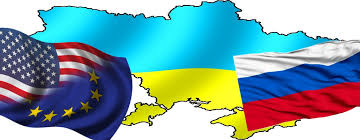
Carter accuses Russia for the crisis in Syria as well, “Russia’s support for the Assad regime in Syria made the situation more dangerous, more protracted and more cruel.”
The USA and the United Kingdom precisely should bear the greatest responsibility for the shattered international order, but instead they blame Russia in an absurd manner for their sins and Carter proudly declares: “The United States and the United Kingdom led a historic coalition that caused permanent injury to IS.”
At the end of his speech, the Secretary of Defense again emphasized that “Russian aggression and barbarity of IS are serious challenges facing the United States and the United Kingdom.”
Of course, Carter’s speech is intended for domestic consumption. Again the target audience is the citizens of the United States and the United Kingdom and they have to be convinced that it is not their rulers who are the destroyers of order; they are its defenders.
A few days later, on September 12, the Minister of Defense of the Russian Federation, Army General Sergei Shoigu, replied to Carter with “do not confuse international order with US order,” stressing that the preservation of international order is a natural obligation of the international community, not just the Pentagon.
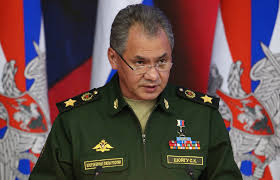
Sergei Shoigu
“It is the United States, along with its Western partners, starting from Bosnia and Kosovo, and ending with Iraq and Libya, consistently destroying the foundations of the existing world order.” From the very beginning of the NATO operation “in dismemberment of Yugoslavia,” Russia has consistently warned about what its actions will lead to there, but the United States has not made the necessary conclusions, stated the Minister.
“And Russia has always maintained support for a fair and multipolar world order in the interest of all countries, not some group, or even less, of a state,” Shoigu noted.
13 September 2016: Andrew Foxall, Director of the Center for Russian Studies, ‘The Henry Jackson Society, and former professor at Oxford University in the

Andrew Foxall
field of politics and security, wrote in an article published in the Daily Star: “At the moment, Britain is ill-prepared to counter Russia. There is an urgent need to strengthen the defense capabilities not only of Britain, but also the members of NATO.” According to the expert, the Alliance does not take enough steps to create military capability “to contain the aggressive and resurgent Russia.”
The author believes that the nuclear potential of Russia was “10 times larger than that of NATO.”
“The behavior of Russia in the last decade in its wars in Georgia and the Ukraine, as well as its actions in Syria are speaking that it would be foolish to exclude Russia as a threat to peace and stability in the world,” Foxall says, and according to him a “catastrophic conflict” in the Baltics between Russia and NATO is very likely.
As of 2016, according to the Federation of American Scientists, Russia has 1 790 nuclear warheads with the relevant aircraft, US – 1 750, France – 280 and Britain with 120. The simple arithmetic shows that NATO has 2 150 nuclear warheads, or 360 more than Russia.
For 2015, according to the Global Fire Power, the military budget of Russia was $46.6 billion, the UK’s was $55 billion, and the US – $581 billion. The overall budget of the member states of NATO amounted to $840 billion. At an 18-fold superiority of the military budget in favor of NATO, to argue that the Alliance does not have sufficient defense capabilities is vulgarity, cynicism and a blatant lie. I will not dwell on manpower, armament and equipment, because it is repeatedly superior in favor of the North Atlantic Treaty. And if NATO could not deal with Russia in case of war, it is better for NATO to dissolve itself in order to stop the plundering of taxpayers. Anyway, NATO proved impotent against terrorism in the Middle East, terrorist attacks in Western Europe in terms of the refugee wave, or against the real threats to Europe.
The article by Andrew Foxall is another example not just of manipulation, but lies and incitement of paranoia by the renowned British expert, teaching young academics at Oxford.
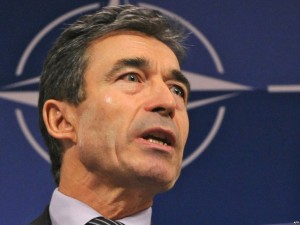
Anders Fogh Rasmussen
September 21, 2016: Former NATO Secretary, General Anders Fogh Rasmussen, wrote in his article published in The Wall Street Journal: “During my visit to Moscow in December 2009, I felt that President Putin challenged the world order created so successfully by the United States after World War II. In early 2014, he invaded Ukraine and began military action in Syria. From my previous posts as prime minister of Denmark and the Secretary General of NATO, I know how important the American leadership is. We desperately need a president of the United States, who is able and has the will to lead the free world and to oppose autocrats like Putin. A President who will lead from the front and not stand behind. The world needs such a policeman so freedom and prosperity take over the forces of oppression. And the only capable, reliable and desirable candidate for this post is the United States …
The Middle East is torn by war. In North Africa, Libya collapsed and became a breeding ground for terrorists. In Eastern Europe, resurgent Russia brutally attacked and seized by force land of Ukraine … Just as we need a policeman to restore order, we need a firefighter to extinguish the flames of the conflict … Only America can play all these roles because of all world powers, only America has the right and ability to shape sustainable solutions to these challenges. Russia is obsessed with restoring the empire that the USSR lost. China is still mainly a regional factor. Europe is weak, divided and unable to lead … This is about morality. Just as only America has the material greatness to stop the slide towards chaos, only America has a moral grandeur to do – not for the sake of power, but in the name of peace.“
However! It was not Putin who ignited the Middle East and turned Libya into a breeding ground for terrorists. Not Russia, but someone else was not satisfied with destroying another country and decided to destroy yet another stable, prosperous and secular country, a model in the Middle East, in the face of Syria. It was not the Kremlin thst sponsored another revolution in the Ukraine and carried out the coup in Kiev.
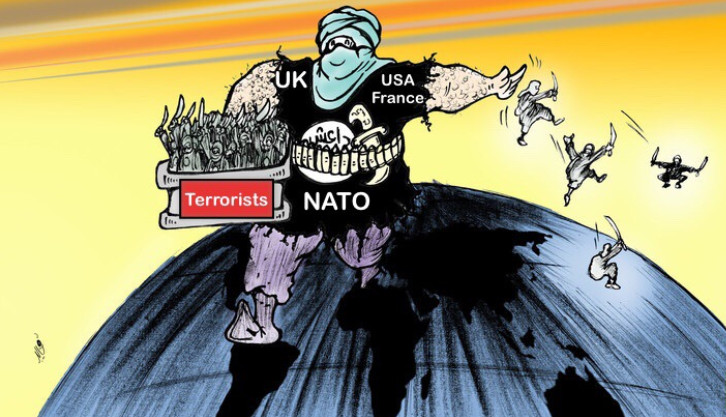
It is interesting to know how Russia “brutally attacked and seized by force land of Ukraine” without any victims on both sides and at the same time, the “rocket-bomb democracy” of the West in the Middle East took millions of lives. It is interesting how Russia is “overwhelmed by the restoration of the empire” when legally returning their illegally taken Crimea that gas belonged to Russia since the time (1783) when the United States declared its independence from the British Empire (1776). It is interesting how “aggressive and imperialist” Russia did not move a centimeter in a western direction (Kaliningrad is the westernmost point of Russia) and the US through NATO reached the borders of Russia, directly endangering national security. In general, how Rasmussen sensed “that President Putin challenged the world order” and not felt at least one of the above events is forcing Russia to take action to protect their interests.
Let’s go rewind the tape back a little: from the end of World War II until 1991 exactly bipolarity and mutually assured destruction (MAD) were guarantors for peace. With the disintegration of the USSR, the US remained the only superpower that instead of working with Russia to preserve and strengthen stability in the world, continued its Cold War. In short, from 1991 up to today, the US has never ceased to perceive Russia as an opponent. For Washington, the USSR lost the war, and this means that Russia is obliged to pay reparations, while the US as a winner, has every right to seize as trophies everything that belongs to Moscow or was in the sphere of its influence. After the collapse of the USSR and the progressive weakening of Russia, Washington expected the right time to apply the final decisive blow, leading to the disintegration of the Russian Federation and the subsequent formation of many countries (divide and conquer).
By 2000, everything was going on according to Washington’s plan … until the advent of Putin, who saved Russia and precisely for this reason, he has become the most hated man in the West. Obviously, the United States today sticks to their plan without actualising it, refusing to recognize the new reality. Metaphorically speaking, if in 2000 Russia was a skinny, sick and dying bear, then Russia in 2016 is a huge bear, strong and ready to crush the neck of every predator who dared to attack him.
The unipolar model failed completely and remained in the past; it is not even a subject of debate. Today, we are witnessing a multipolar world in which the United States are far from absolute dominance: those who oppose them, have a growing resource. In the event of a protracted war, not the dollars and the control of the international financial institutions will be decisive, but the human capital, natural resources, combat capabilities and potential and the technologies. Considering the modern attitudes of the Western society in Europe, we can conclude that neither the citizens nor their leaders are eager to fight against Russia and China in the US’s interest because they know that this is suicidal. As for NATO II (the former socialist republics of the Sanitary Cordon), to neutralize them is a matter of a few dozen cruise missiles at strategic sites (such as nuclear power stations, dams, chemical plants) and the war for the eager to prove loyalty to the new master countries will end before it has even begun.
The world order after World War II was created on the basis of bipolarity, in other words, it is based on the existence of the US and the USSR and respective satellites at both poles.
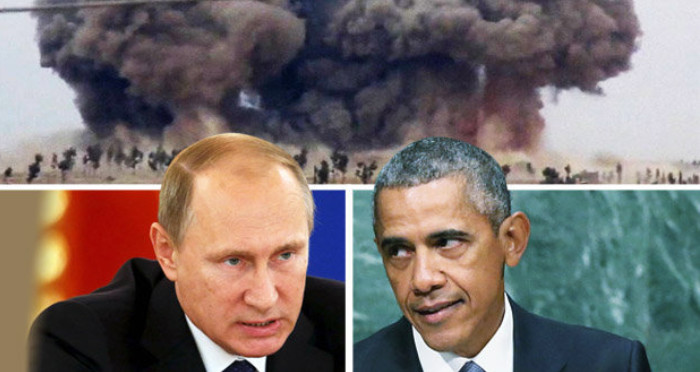
To prove this, I will cite one obvious example: the Security Council of the United Nations is a permanent organ of the United Nations, which in accordance with Article 24 of the UN Charter, has been assigned primary responsibility for maintaining international peace and security through initiating peacekeeping operations, international sanctions and issuing resolutions for military action. And something very important – the Security Council is the only UN body i.e., the only legitimate global body with the power to issue binding decisions on member states of the United Nations. Not coincidentally, the Security Council included not one but fivDavid Swansone equal states enjoying veto power – the US, Russia, China, Britain and France. And since January 17, 1946, when the Security Council held its first meeting up to today, this model is an example of multi-polarity and prevents a single country from becoming a monopolist in the decisions affecting all mankind.
Rejecting the international legal order operating for 60 years, Rasmussen openly propagates Nazism, therefore, I do not see in which way the ideas and proposals of the former secretary-general of NATO, set out in his article, differ from those of Adolf Hitler: the Fuhrer is the greatest head of state, the German nation is the supreme and superior to all others because of its exclusivity, and the German State alone has the moral right to take military interventions – directly or indirectly – anywhere and at any time, just because it is the City upon the Hill.

David Swanson
Extracts from the book, War No More: The Case for Abolition (first edition, 2013), of the famous American activist and blogger, David Swanson:
“Since the end of World War II, there were 248 armed conflicts in 153 locations worldwide. The USA took 201 overseas military operations between the end of World War II and 2001, and all others since then, including Afghanistan and Iraq … The share of civilian casualties … constitutes 85% to 90% of victims caused by the war,” i.e., for every 10 dead, only one has had the status of a combatant … The number of those killed (mostly civilians) as a result of the recent war in Iraq … vary from 124 000 to 655 000 and more than a million, and according to recent figures: about half a million … The United States accounts for 41% of the total military spending worldwide. China follows with 8.2%; Russia – 4.1%; UK and France by 3.6%…
The United States maintain 700 to 1 000 bases or areas in over 100 countries … In 2011, the US was first in the world for sales of conventional arms, making up to 78% ($66 billion) … In 2011-2012, the top seven US companies manufacturing and servicing weapons, assisted the federal election campaign with $9.8 million. Five of the top 10 military aerospace corporations in the world (three American and two European) spent $53 million on lobbying for the US government in 2011. … By promoting military solutions to political problems and present military action as inevitable, the military often influences the media, which, in turn, creates public acceptance of war or desire for war … ” – that is the ‘moral greatness’ of America. This is what Rasmussen speaks about, trying to protect the long-lost virginity reputation of the United States.”
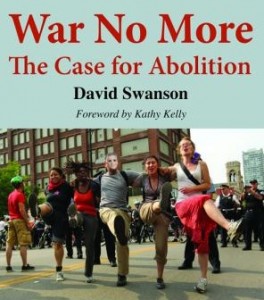
And speaking of the military-industrial complex (MIC), the prophetic words of former US president, Dwight Eisenhower, come to my mind, who in his farewell address to the nation, made on January 17, 1961, warned American society that the military and corporate interests will increasingly work together against the interests of the citizens at that. Even then, the president called this phenomenon a ‘military-industrial complex’: “The total impact (of MIC – author’s note) – economic, political, and even spiritual – is felt in every city, every Capitol, each office of the federal government. We recognize the imperative need for this development. At the same time, we must realize its serious consequences. Our labor, resources and livelihood are part of it; so is the very structure of our society. In the councils of government we must guard against the acquisition of unwarranted influence, requested or not by the military-industrial complex. The potential for the disastrous rise of unwarranted power exists and will persist. We must never let the weight of this combination endanger our liberties or democratic processes.”
Today the MIC “is much more devastating than Eisenhower thought it would ever be,” Lawrence Wilkerson says, a former colonel and chief of staff to US Secretary of State, Colin Powell.
According to the Russian Ambassador to Latvia, Alexander Veshnyakov, as during the Cold War, today, the winning card for MIC turns out to be the demonizing of Russia – this is how the lobbies of the Western MIC convince taxpayers of the need to increase the defense spending of the US and NATO.

Jan Oberg
The Director of the Transnational Foundation for Peace and Future Research, Jan Oberg, is of the same opinion. According to him, it comes to militarism. In 2015, Oberg said: “Most people think that first, the threat must be determined and then, determine what military power is needed. Here it is reversed: if you need militarism … invent threats to legitimize the military policies and budgets, that all increase in this specific part of the world.”
A year later, Jan Oberg confirmed his words: “In recent years, the dialogue in the sphere of ensuring security practically stopped. There is only the policy of confrontation by NATO, which is 10 times stronger than Russia. If it is not stated that someone threatens you, the taxpayers will wonder why spend money on defense rather than on education, culture and infrastructure. The military-industrial complex, as well as its subordinate media and education, are interested in citizens paying for new weapons, regardless of whether there is a war and a real threat.”
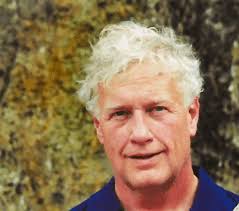
Gordon Duff
Moreover, Gordon Duff, Editor-in-Chief of the popular US magazine, Veterans Today, said: “We’re tired of Raytheon Corporation and amorous ties with IS and al Nusra. The continuous supply of terrorist organizations with missiles is not accidental, therefore, those of the management of Raytheon must be held accountable, arrested, tried and convicted, not only in the US but also in Iraq and Syria, as well as for their material support of terrorism. Ukrainians, Georgians, Saudis, thousands of Turks, Kuwaitis and Jordanians, not to mention the government of Israel – all of which poured weapons into the hands of IS, must be held accountable.”
On the occasion of the above-cited in this text, speeches of high-ranking politicians and military, Paul Roberts writes: “These assertions are propagandistic. If those who made these statements actually believe in them, they are too imbecilic to be entrusted government positions. Could the Czech general not know that Russia is using its military only to repel a Georgian invasion of South Ossetia inspired by Washington and against IS in Syria, which the US, Britain and France also argue that they do? Once reflecting on the Georgian invasion, Russia withdrew its troops. After the temporary defeat of IS in Syria, Russia withdrew but was forced to return because of the re-supply of IS from Washington. Can the Polish Foreign Minister define the countries that “Russia continues to attack”? Does the US president really know that Russia is not a party to the agreement on ceasefire in the Ukraine? This is an agreement between the breakaway republics and the government in Kiev. Washington did everything possible to dissuade Kiev to comply with the agreement, which Kiev signed. Can the National Security Adviser, Rhodes (Benjamin of Rhodes, J. – author’s note), tell us where the “continuing aggression by Russia” is taking place? Which countries are attacked and destroyed?”
The paranoid-schizophrenic rhetoric of the West towards Russia is spinning the same record with the following long-worn-out songs about the imperial ambitions of Moscow, the impending attack of Russia on the Baltic members of NATO, Russia’s attempts to regain control over the post-Soviet space, policy of revanchism pursued by the Kremlin, violation of international law, the threat that Moscow represents for the architecture of European, even global, stability and security (threat greater than the ‘Islamic State’, according to the Foreign Minister of Poland, and according to informal spokesman of the State Department and founder of STRATFOR, George Friedman). All those corny songs are based on a foundation with three supporting columns (pillars), namely:
- war with Georgia
- military operation in Syria
- intervention in Ukraine (Crimea, Donbass)
For this reason, in the next parts of this monograph, I will alert the honorable reader on key moments of the military operation of Russia in Syria amid the crisis in the Middle East since 2003; the actions and measures that Russia has taken after the coup in Ukraine; and Russia’s war with Georgia. I would like to emphasize that in all three cases, Russia is forced to participate i.e., the territories of the above-mentioned three countries have been turned into an arena for proxy confrontation between Washington and Moscow. Of course, I leave the honorable reader the right to pronounce a verdict after assessment and evaluation and decide on who and what goals are pursued in this geopolitical game.

In response to the systematic accusations of Russia for interference and violation of the sovereignty of independent states, I will allow myself to quote Lawrence Wilkerson, who, in connection with the attempted coup in Turkey on 15 July 2016, thinks that CIA Director, John Brennan, “undoubtedly played a role.” The US has institutionalized coups as a standard political and military tool for removing governments hostile to US interests and only during the period of Ronald Reagan’s administration, the CIA carried out 58 covert operations, the former colonel says.
Before proceeding to remove the mask of information warfare, I will quote a brief excerpt from the interview which the President of the Russian Federation, Vladimir Putin, gave recently to Bloomberg: “If you look at the West and summarize what they think, perhaps, they say, the roots of distrust is in that you want to expand the area of influence of Russia, maybe not geographically, but at least, to control the countries across the border. Now, of course, the nervousness is mainly because the Baltic states (Latvia, Estonia and Lithuania). You talked about trust. Can you say something to reassure them on this point,” the Chief Editor of Bloomberg, Joh Micklethwait, said to Putin.
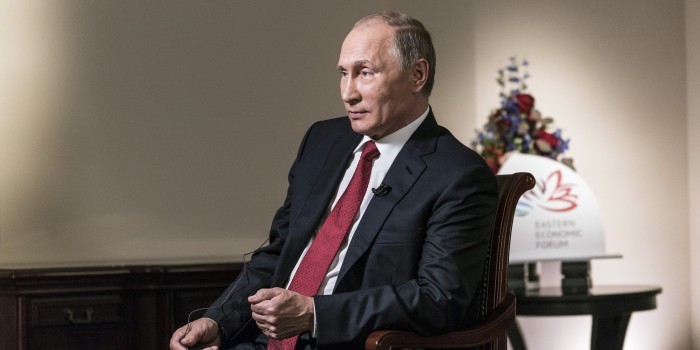
“Look, I think that all reasonable people who are really involved in politics understand that references to the threat from Russia regarding the Baltics – this is nonsense. Are we preparing for a war with NATO? How many people live in NATO countries? About 600 million, right? (the total population of the member countries is about 930 million – author’s note) and in Russia – 146 million. Yes, we are the largest nuclear state. Do you really presume that we plan to conquer the Baltic states using nuclear weapons? What nonsense?!“




Talking is cheap. We all know that.
Why Russia didn’t expose 9/11 lies ??
Why Russia didn’t expose the creation of Daesh by USA ??
Why Russia didn’t sold S-300 to Syria despite military bases in Syria ??
Why Russia didn’t expose war crimes in Irak, in Afghanistan, … ?
Iran is strong and Hezbollah is strong but Russia is weak and always want to please the west. Either Russia starts a full-scale fight either Russia resigns. I am fed up with the demi-fight of Russia.